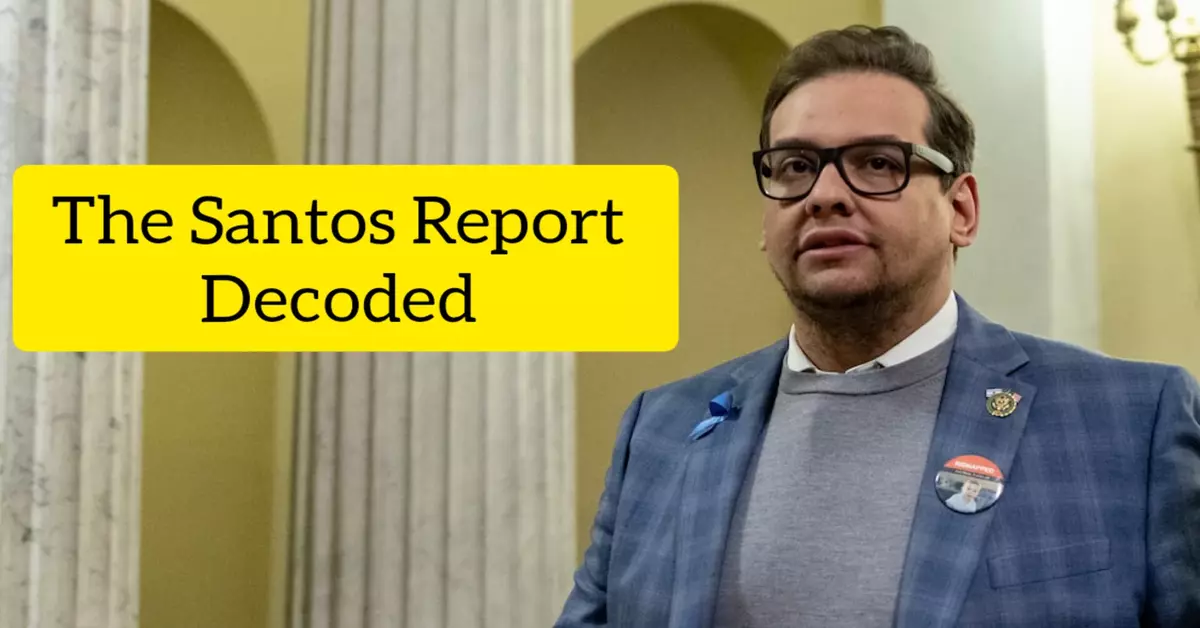In recent developments, the Ethics Committee has released the long-awaited Santos Report, shedding light on a series of allegations against prominent political figures. Let’s delve into the intricacies of the report and understand its implications on the political landscape.
Table of Contents
Background of the Santos Report
The Santos Report originated from concerns raised about ethical misconduct within the political sphere. This investigation aimed to scrutinize the actions of key players, including high-profile politicians and influential figures.
Unraveling the Ethics Committee Findings
Allegations and Investigations
The report meticulously details the allegations brought against individuals involved in the political arena. The Ethics Committee conducted thorough investigations to uncover the truth behind each claim.
Key Players Involved
Prominent figures found themselves under the committee’s scrutiny, with their actions becoming the focal point of intense public and media attention.
The Impact on Political Landscape
Public Perception
As the report became public, it significantly influenced how the general populace perceived the individuals implicated, raising questions about the integrity of the political system.
Repercussions on Santos’ Political Career
For Santos, a seasoned politician, the report’s release had far-reaching consequences, leading to a reevaluation of his political standing and future prospects.
Legal Ramifications and Accountability
Committee Recommendations
The Ethics Committee, in its findings, outlined recommendations for legal action and steps to hold those responsible accountable for their actions.
Potential Legal Consequences
Legal experts are now assessing the potential legal consequences for the individuals named in the report, with discussions centered around the application of justice.
Transparency in Governance
Importance of Ethical Leadership
The Santos saga emphasizes the critical role ethical leadership plays in maintaining transparency within governance structures.
Rebuilding Trust
Rebuilding public trust becomes paramount in the aftermath of such revelations, necessitating proactive measures to address concerns.
Lessons Learned from the Santos Saga
The Role of Ethics Committees
The Santos Report prompts a reexamination of the efficacy and importance of ethics committees in ensuring ethical conduct within political circles.
Preventive Measures for Future Incidents
Learnings from the Santos case can be instrumental in implementing preventive measures to avoid similar ethical lapses in the future.
Addressing Perplexity: Navigating the Complexities
Interpreting Committee Findings
Interpreting the committee’s findings requires careful consideration of the nuances involved, avoiding oversimplification of complex ethical issues.
Understanding Ethical Dilemmas in Politics
Ethical dilemmas in politics are often multifaceted; understanding these complexities is crucial in forming an informed opinion on the Santos Report.
Burstiness in Media Coverage
Media’s Role in Shaping Public Opinion
Media coverage of the Santos Report has been characterized by burstiness, with intense periods of coverage influencing public perception.
Balancing Sensationalism and Objectivity
Journalistic responsibility entails striking a balance between sensationalism and objectivity, ensuring accurate representation of the report’s findings.
Maintaining Specificity in Ethical Discussions
Focusing on Core Ethical Issues
Maintaining specificity involves addressing the core ethical issues raised in the Santos Report, steering clear of tangential discussions.
Avoiding Distractions
In ethical discussions, avoiding distractions is key to fostering a focused dialogue on the pertinent issues at hand.
Contextualizing Santos’ Situation
Political Landscape at the Time
Understanding the political landscape at the time of the events under scrutiny provides valuable context to the Santos Report.
External Factors Influencing the Report
External factors, such as socio-political dynamics, may have played a role in shaping the narrative of the report.
Engaging the Reader: Santos’ Impact on Democracy
Democracy in the Spotlight
The Santos Report puts democracy in the spotlight, prompting reflections on the resilience of democratic institutions in the face of ethical challenges.
Civic Responsibility in Ethical Governance
As citizens, understanding our civic responsibility in upholding ethical governance becomes crucial in the aftermath of reports like Santos’.
Adopting a Conversational Style: The Human Aspect
Understanding the Human Element in Politics
At its core, politics is inherently human. Recognizing the human element in political narratives fosters a more relatable and engaging discussion.
Relating to the Audience
Engaging with the audience involves relating the complexities of the Santos saga to everyday experiences, making the ethical dilemmas more relatable.
Conclusion: A Call for Ethical Leadership
In conclusion, the Santos Report serves as a clarion call for ethical leadership within the political sphere. It highlights the need for transparency, accountability, and a commitment to upholding ethical standards.
FAQs
- Is the Santos Report the first of its kind?
- No, similar investigations have occurred in the past, but the Santos Report has garnered significant attention due to the involved personalities.
- What actions can the Ethics Committee take against those implicated?
- The Ethics Committee can recommend legal action, sanctions, or other measures depending on the severity of the ethical breaches.
- How can the public rebuild trust in the political system post-Santos Report?
- Rebuilding trust requires a commitment to transparency, accountability, and tangible actions to address the issues raised in the report.
- What role does media play in shaping public perception of ethical matters in politics?
- Media plays a crucial role in influencing public opinion; responsible reporting is essential to ensure a fair representation of ethical issues.
- How can citizens contribute to fostering ethical governance?
- Citizens can contribute by staying informed, participating in civic activities, and holding elected officials accountable for their actions.

